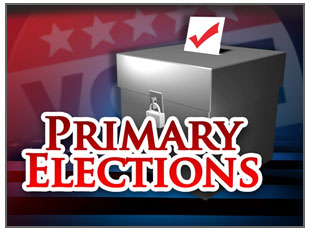Most, but not all, of the primary will happen on March 15. The primary elections for U.S. House of Representatives are expected to be on Tuesday, June 7, because of an ongoing federal court case.
The North Carolina General Assembly decided several years ago that it wanted to move up the Presidential primary because in past years, major parties had already chosen their nominees by the time North Carolina voted. The state’s political leaders figured this move would make North Carolina a bigger player on the national stage, which would bring more attention and campaign money to the state.
Last year, the General Assembly decided to move up not just the Presidential primary — but the entire primary election for all national, state, and local offices.
This move, legislators said, would save the cost of having two primaries — estimated at between $5 million to $10 million. It would also increase voter participation, since turnout is always higher in Presidential election years.
So last fall, the General Assembly settled on the March 15 date, which meant candidates for all races would have to file for offices in December.
And as the state and county election boards were gearing up for the March 15 primary, a federal court threw a monkey wrench in the works.
A three-judge panel ruled on Friday, Feb. 5, that two of North Carolina’s 13 congressional districts — the 1st and the 12th– were racially gerrymandered — that is drawn to unconstitutionally pack black voters in the districts.
Both the federal court and the U.S. Supreme Court refused to allow the North Carolina primary to proceed while the district lines were being redrawn and litigated.
Also, redrawing those congressional districts affects others, such as the 3rd, which includes Hatteras and Ocracoke islands. The islands are represented by Republican Walter Jones, who is being challenged in the Republican primary by Taylor Griffin of New Bern and Phil Law of Jacksonville.
The end result is that the General Assembly has redrawn the congressional districts, which still must be approved by the court before there can be an election.
The legislature has tentatively set the primaries for the U.S. House of Representatives for Tuesday, June 7, which means that the state will have two primaries, after all.
However, all of the other federal, state, and local primary races are on the March 15 ballot, including the one for President of the United States.
The primary election also presents other challenges for North Carolina.
This is the first election in North Carolina in which voters will have to produce identification to cast a ballot.
The voter I.D. requirement and the state’s 2013 voter law are still under legal challenge from plaintiffs who charge they discriminate against minorities. In addition, the state legislature has modified the photo I.D. requirement to allow some voters without photo identification to cast provisional ballots. In the face of all this change, the state has been trying to educate voters about what kind of I.D. will be acceptable at polling places.
Also on the ballot will be a $2 billion bond initiative, known as Connect NC, sought by the governor, that will provide funds for the University of North Carolina system, community colleges, infrastructure such as water and sewer systems, state parks and zoos, the Department of Agriculture and Consumer Services, and the Department of Public Safety.
The Outer Banks Chamber of Commerce last week endorsed the Connect NC bond.
Finally, there are non-partisan contests for the Dare County Board of Education that will be decided on March 15.
Two of the four BOE seats that are on the ballot are competitive, including the District 4 contest that includes Hatteras Island in which Carlos Babalonia of Buxton is running against Mary Ellon Ballance of Hatteras village. The other competitive race is in District 5 between David Twiddy and Brandy Foreman.
Following is more information on voting.
The North Carolina law that makes changes to elections laws, including requiring identification, is being challenged in the courts. However, beginning March 15, voters will have to produce an ID with a photo while the case makes its way through the judicial system.
Acceptable forms of voter identification include:
If you do not have one of the forms of ID that is listed as acceptable, you can get a free identification card from the Division of Motor Vehicles.
To get the free DMV card you will need two documents that prove your age and identity, such as birth certificates, court documents, or tax forms; one document to prove North Carolina residency, such as a lease, voter registration card, or utility bill, and your Social Security number.
Voters who are unable to obtain an acceptable photo ID because of a “reasonable impediment” may still vote a provisional ballot at the polls. The state Board of Elections say “reasonable impediment includes lack of proper documents, family obligations, transportation problems, work schedule, illness, or disability.”
If you claim a reasonable impediment, you must complete and sign a declaration form and provide one of several alternative forms of identification.
More information, including pictures of acceptable identification, a video on the new photo ID law, and reasonable impediments is available at http://voterid.nc.gov/.









